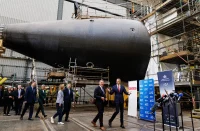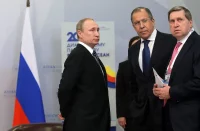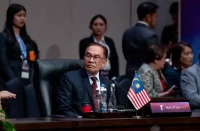This interview with Giulietto Chiesa, Member of the European Parliament, political analyst and journalist, took place shortly after the August 2008 war in South Ossetia. Nevertheless, it is still relevant, and we are publishing it for the first time in English with minor cuts.
– What role can the European Union play in resolving the conflict in the Caucasus?
– The European Union has played a definite role in stabilizing the situation through the efforts of French President Sarkozy. In my opinion, he took a realistic approach to the problem. He and President Medvedev signed the widely acclaimed six-point agreement, and that document took Russia’s demands into account. However, judging by what happened at a NATO Council meeting held in Tbilisi, the alliance’s leadership does not agree with Sarkozy’s approach; nor is it very happy with his playing such a constructive role. NATO is evidently committed to another solution of the South Ossetia and Abkhazia problem. That means Europe and the West in general are divided in their attitude toward Russia. There are more reasonable forces who want to look on Russia as a partner. And then there are those who want to isolate Russia and start a new round of the Cold War. Everything depends on how the struggle between those trends plays out.
– With his mediation mission, Sarkozy was able to get the jump on the United States. If the United States had entered the conflict it probably would have acted more harshly and unilaterally. What do you think of Washington’s policy in this regard?
– There are also two factions within the US political elite. Mr. Saakashvili is a puppet of the American neoconservatives. He acted in concert with them and at their bidding. In short, the war in South Ossetia was provoked by certain groups in the United States. But there are other forces in the United States that are not as aggressive. And it is still unclear how the confrontation between the two approaches will work out. …The entire American system is on the verge of a gigantic bankruptcy. Will the United States be able to get out of the hole it is in without dramatically altering the structure of its financial system, its industry, its organization and its use of energy? I am quite pessimistic about that because I see difficult times ahead. At present, there is no leadership capable of initiating a profound change. I sense a growing danger of war because the United States will be sorely tempted to try and resolve all its problems by force and dictate conditions to the entire world. …It appears to me that Obama is also held captive by the forces that dragged the country into catastrophe. So to answer your question, I will say that I welcome the new Russia, which is consolidating its position on the international stage and in the construction of a multipolar world. If Russia were weak, the danger of war would be much greater than it currently is. A strong Russia allows us to hope for a more balanced system in the world. We’ll see. Of course, I believe that Europe could play a positive role in this area.
– What caused people in the West to have such a negative opinion about Russia’s actions in South Ossetia? Why have many turned a blind eye to what provoked Georgia’s treacherous attack on South Ossetia?
– Old ideas about Russia still influence public opinion in some European sectors. The West’s education system and the media are still in conservative hands. This powerful capability affects millions and tens of millions of people. And that has led to the result you mentioned. Millions of people receive a distorted picture of events, believe it and absorb it into their consciousness, so to speak. That means Russia is facing the enormous task of developing an information and political strategy that will show the world a different and true side of Russia and defend it against the information attack being run by conservatives in the United States of America.
– So far as we know, the news coverage of the conflict over South Ossetia has been inadequate. People in the West have been shown an inaccurate picture…
– The picture has not only been inaccurate from the very beginning, it has been completely distorted. For 10-15 days, everything that was said, written and depicted in Western media indicated that Russia was setting out to conquer Georgia. All of the newspapers ran stories about the events of 1968, when Warsaw Pact tanks rolled into Czechoslavakia. But the parallel was not only unfounded, it was simply a propaganda ploy intended to create the impression that Russia was again attacking a free country with the goal of overthrowing its legitimate government. That was clearly not the case. But who does know the truth? It’s obvious to specialists and to the more or less honest political analysts, but the ordinary citizen in Italy, Germany and France doesn’t understand. Because people were bombarded every day with disinformation about how Russian tanks were about to reach Tbilisi, many believed it. That, of course, was a fundamental misrepresentation of what was actually happening. The International Herald Tribune, the Guardian and other European newspapers are only now beginning to say Georgia attacked South Ossetia, the city of Gori was not damaged as much as initial reports indicated, and Russia had no intention of conquering Georgia. But all of this has only now become clear to the Western listener, reader and viewer. Bad political decisions were made―the resolution of the European Parliament was one―under the influence of emotions generated by false information.
– You took part in the Valdai conference and met with Medvedev and Putin. What struck you as the most important thing you heard in Sochi and Moscow? What were the main conclusions you drew from those conversations?
– My first conclusion was that Russia’s leaders are in complete unanimity. All attempts to make it appear that Putin and Medvedev disagree about some things are completely groundless. From what I saw and heard, I can say this: there are no differences between the two leaders. On the contrary, I saw a solid link between the President and the Premier. When two leaders can spend two days speaking separately to an audience of more than 40 Western political analysts, that means they aren’t afraid to reveal their positions. Also, both Putin and Medvedev each spent three hours giving very detailed answers to our questions with no differences between them. I was even a little surprised to hear your leaders speak so clearly and definitively, while our politicians often did not tell us the truth. That was my first conclusion.
My second conclusion was that Russia is in a very strong and advantageous position―but I already knew that. That was not the case 10 years ago, but now it is. Both Putin and Medvedev said they’re ready for dialogue with the West, they don’t want a Cold War, and they believe it would be pointless. Nevertheless, they said that if they’re provoked, they’ll respond very harshly. They were both very definite about that. This all shows that the world is at a very serious turning point with Russia no longer in retreat. Russia had been retreating before―for many reasons that I won’t go into. After winning the Cold War, the United States decided to continue its offensive and did so by expanding NATO’s borders. And now Russia no longer has any reason to give way. In the case of Georgia it was obvious that the attack was organized and planned. Why should Russia give way in this instance? It was simply impossible. President Medvedev said it very clearly: what did they expect us to do after Russian soldiers and citizens were killed? What country could ignore something like that? Analyzing all this as a European I think that both European and American leaders need to look at things realistically and take the new realities into account. Russia is no longer what it was 10 years ago, and it is becoming dangerous to escalate tensions in dealing with it. If we continue this foolish approach, it will jeopardize the overall security situation in Europe and the world. Today I see a very strong Russia that will not retreat.
Source: New Eastern Outlook














Comments